1 中断下半部分引入
引入中断下半部介绍了硬件中断和软件中断,硬件中断有gpio中断,网卡,外部电路IP引起的中断,而软件中断则有定时器,tasklet这些为软件中断。cpu会先处理硬件中断,然后处理软件中断。
简单说可以认为内核中有一个数组softirq[], 里面有很多项,某一项都应timer,某一项表示tasklet, 每一项中都有一个.action函数,当内核处理完某一个硬件中断之后,处理软件中断时会找到对应的项,找到.action函数执行。
对于tasklet软件中断,它的.action函数对应tasklet_action,这个函数会从链表里取出每一个tasklet结构,执行里面的.func函数。
内核处理硬件中断的过程叫做中断上半部,处理软件中断的过程叫做中断下半部。上半部执行过程中,中断是禁止的,这里防止中断嵌套,也就是说来了更紧急的硬件中断,也要等这个上半部分处理完,上半部一般处理重要紧急事情。下半部执行过程中,中断是使能的,因此在下半部的处理过程它是可以响应其他中断。因此如果有不紧急但是耗时的事情放在下半部来处理,比如用tasklet。
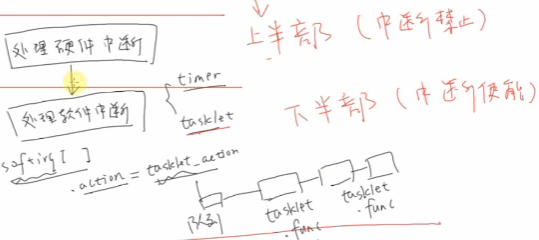
2 tasklet是如何从从上半部调度到下半部分
如何使能或者说调度tasklet呢?它其实就是把一个tasklet放入到内核tasklet链表中,假如硬件中断服务函数func_A(), 软件中断中也就是下半部放入tasklet中断的服务函数为func_B(), 那么可以想象看A和B被调度的次数因该是多对1的关系,应为软件中断由于是使能中断的,因此func_A()对应的硬件又可能会产生硬件中断。
3 tasklet使用
3.1 初始化tasklet
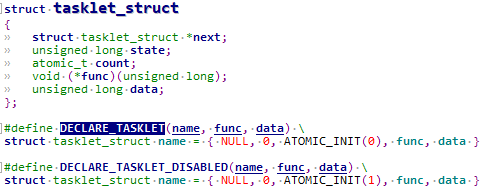
/* Tasklets --- multithreaded analogue of BHs.
Main feature differing them of generic softirqs: tasklet
is running only on one CPU simultaneously.
Main feature differing them of BHs: different tasklets
may be run simultaneously on different CPUs.
Properties:
* If tasklet_schedule() is called, then tasklet is guaranteed
to be executed on some cpu at least once after this.
* If the tasklet is already scheduled, but its execution is still not
started, it will be executed only once.
* If this tasklet is already running on another CPU (or schedule is called
from tasklet itself), it is rescheduled for later.
* Tasklet is strictly serialized wrt itself, but not
wrt another tasklets. If client needs some intertask synchronization,
he makes it with spinlocks.
*/
struct tasklet_struct
{
struct tasklet_struct *next;
unsigned long state;
atomic_t count;
void (*func)(unsigned long);
unsigned long data;
};
\include\linux\interrupt.h,
state 有 2 位:

◼ bit0 表示 TASKLET_STATE_SCHED
等于 1 时表示已经执行了 tasklet_schedule 把该 tasklet 放入队列了;(等于1表示放入队列就绪了)
tasklet_schedule 会判断该位,如果已经等于 1 那么它就不会再次把tasklet 放入队列。
◼ bit1 表示 TASKLET_STATE_RUN
等于 1 时,表示正在运行 tasklet 中的 func 函数;函数执行完后内核会把该位清 0。
count 表示该 tasklet 是否使能:
等于 0 表示使能了,非 0 表示被禁止了。对于 count 非 0 的 tasklet,里面的 func 函数不会被执行
DECLARE_TASKLET和DECLARE_TASKLET_DISABLED可以定义一个tasklet结构体。
使用 DECLARE_TASKLET 定义的 tasklet 结构体,它是使能的;
使用 DECLARE_TASKLET_DISABLED 定义的 tasklet 结构体,它是禁止的;使用之前要先调用 tasklet_enable 使能它。
//也可以用函数进行定义
extern void tasklet_init(struct tasklet_struct *t, void (*func)(unsigned long), unsigned long data);

3.2 使能/禁止 tasklet
static inline void tasklet_enable(struct tasklet_struct *t);
static inline void tasklet_disable(struct tasklet_struct *t);
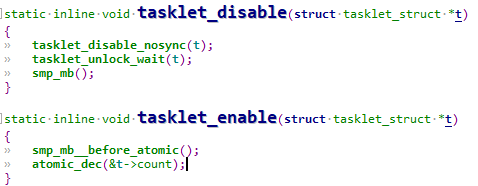
3.3 调度执行tasklet
static inline void tasklet_schedule(struct tasklet_struct *t);

把 tasklet 放入链表,并且设置它的 TASKLET_STATE_SCHED 状态为1。tasklet_schedule 只是把 tasklet 放入内核队列,它的 func 函数会在软件中断的执行过程中被调用。
3.4 tasklet_kill
void tasklet_kill(struct tasklet_struct *t);
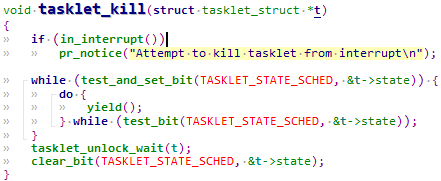
如果一个 tasklet 未被调度, tasklet_kill 会把它的TASKLET_STATE_SCHED 状态清 0;
如果一个 tasklet 已被调度,tasklet_kill 会等待它执行完华,再把它的TASKLET_STATE_SCHED 状态清 0。
通常在卸载驱动程序时调用 tasklet_kill。
4 tasklet代码示例解析
驱动代码
#include <linux/module.h>
#include <linux/poll.h>
#include <linux/fs.h>
#include <linux/errno.h>
#include <linux/miscdevice.h>
#include <linux/kernel.h>
#include <linux/major.h>
#include <linux/mutex.h>
#include <linux/proc_fs.h>
#include <linux/seq_file.h>
#include <linux/stat.h>
#include <linux/init.h>
#include <linux/device.h>
#include <linux/tty.h>
#include <linux/kmod.h>
#include <linux/gfp.h>
#include <linux/gpio/consumer.h>
#include <linux/platform_device.h>
#include <linux/of_gpio.h>
#include <linux/of_irq.h>
#include <linux/interrupt.h>
#include <linux/irq.h>
#include <linux/slab.h>
#include <linux/fcntl.h>
#include <linux/timer.h>
struct gpio_key{
int gpio;
struct gpio_desc *gpiod;
int flag;
int irq;
struct timer_list key_timer;
struct tasklet_struct tasklet;
} ;
static struct gpio_key *gpio_keys_100ask;
/* 主设备号 */
static int major = 0;
static struct class *gpio_key_class;
/* 环形缓冲区 */
#define BUF_LEN 128
static int g_keys[BUF_LEN];
static int r, w;
struct fasync_struct *button_fasync;
#define NEXT_POS(x) ((x+1) % BUF_LEN)
static int is_key_buf_empty(void)
{
return (r == w);
}
static int is_key_buf_full(void)
{
return (r == NEXT_POS(w));
}
static void put_key(int key)
{
if (!is_key_buf_full())
{
g_keys[w] = key;
w = NEXT_POS(w);
}
}
static int get_key(void)
{
int key = 0;
if (!is_key_buf_empty())
{
key = g_keys[r];
r = NEXT_POS(r);
}
return key;
}
static DECLARE_WAIT_QUEUE_HEAD(gpio_key_wait);
static void key_timer_expire(unsigned long data)
{
/* data ==> gpio */
struct gpio_key *gpio_key = data;
int val;
int key;
val = gpiod_get_value(gpio_key->gpiod);
printk("key_timer_expire key %d %d\n", gpio_key->gpio, val);
key = (gpio_key->gpio << 8) | val;
put_key(key);
wake_up_interruptible(&gpio_key_wait);
kill_fasync(&button_fasync, SIGIO, POLL_IN);
}
static void key_tasklet_func(unsigned long data)
{
/* data ==> gpio */
struct gpio_key *gpio_key = data;
int val;
int key;
val = gpiod_get_value(gpio_key->gpiod);
printk("key_tasklet_func key %d %d\n", gpio_key->gpio, val);
}
static ssize_t gpio_key_drv_read (struct file *file, char __user *buf, size_t size, loff_t *offset)
{
//printk("%s %s line %d\n", __FILE__, __FUNCTION__, __LINE__);
int err;
int key;
if (is_key_buf_empty() && (file->f_flags & O_NONBLOCK))
return -EAGAIN;
wait_event_interruptible(gpio_key_wait, !is_key_buf_empty());
key = get_key();
err = copy_to_user(buf, &key, 4);
return 4;
}
static unsigned int gpio_key_drv_poll(struct file *fp, poll_table * wait)
{
printk("%s %s line %d\n", __FILE__, __FUNCTION__, __LINE__);
poll_wait(fp, &gpio_key_wait, wait);
return is_key_buf_empty() ? 0 : POLLIN | POLLRDNORM;
}
static int gpio_key_drv_fasync(int fd, struct file *file, int on)
{
if (fasync_helper(fd, file, on, &button_fasync) >= 0)
return 0;
else
return -EIO;
}
static struct file_operations gpio_key_drv = {
.owner = THIS_MODULE,
.read = gpio_key_drv_read,
.poll = gpio_key_drv_poll,
.fasync = gpio_key_drv_fasync,
};
static irqreturn_t gpio_key_isr(int irq, void *dev_id)
{
struct gpio_key *gpio_key = dev_id;
//printk("gpio_key_isr key %d irq happened\n", gpio_key->gpio);
tasklet_schedule(&gpio_key->tasklet);
mod_timer(&gpio_key->key_timer, jiffies + HZ/50);
return IRQ_HANDLED;
}
/* 1. 从platform_device获得GPIO
* 2. gpio=>irq
* 3. request_irq
*/
static int gpio_key_probe(struct platform_device *pdev)
{
int err;
struct device_node *node = pdev->dev.of_node;
int count;
int i;
enum of_gpio_flags flag;
printk("%s %s line %d\n", __FILE__, __FUNCTION__, __LINE__);
count = of_gpio_count(node);
if (!count)
{
printk("%s %s line %d, there isn't any gpio available\n", __FILE__, __FUNCTION__, __LINE__);
return -1;
}
gpio_keys_100ask = kzalloc(sizeof(struct gpio_key) * count, GFP_KERNEL);
for (i = 0; i < count; i++)
{
gpio_keys_100ask[i].gpio = of_get_gpio_flags(node, i, &flag);
if (gpio_keys_100ask[i].gpio < 0)
{
printk("%s %s line %d, of_get_gpio_flags fail\n", __FILE__, __FUNCTION__, __LINE__);
return -1;
}
gpio_keys_100ask[i].gpiod = gpio_to_desc(gpio_keys_100ask[i].gpio);
gpio_keys_100ask[i].flag = flag & OF_GPIO_ACTIVE_LOW;
gpio_keys_100ask[i].irq = gpio_to_irq(gpio_keys_100ask[i].gpio);
setup_timer(&gpio_keys_100ask[i].key_timer, key_timer_expire, &gpio_keys_100ask[i]);
gpio_keys_100ask[i].key_timer.expires = ~0;
add_timer(&gpio_keys_100ask[i].key_timer);
tasklet_init(&gpio_keys_100ask[i].tasklet, key_tasklet_func, &gpio_keys_100ask[i]);
}
for (i = 0; i < count; i++)
{
err = request_irq(gpio_keys_100ask[i].irq, gpio_key_isr, IRQF_TRIGGER_RISING | IRQF_TRIGGER_FALLING, "100ask_gpio_key", &gpio_keys_100ask[i]);
}
major = register_chrdev(0, "100ask_gpio_key", &gpio_key_drv); /* /dev/gpio_key */
gpio_key_class = class_create(THIS_MODULE, "100ask_gpio_key_class");
if (IS_ERR(gpio_key_class)) {
printk("%s %s line %d\n", __FILE__, __FUNCTION__, __LINE__);
unregister_chrdev(major, "100ask_gpio_key");
return PTR_ERR(gpio_key_class);
}
device_create(gpio_key_class, NULL, MKDEV(major, 0), NULL, "100ask_gpio_key"); /* /dev/100ask_gpio_key */
return 0;
}
static int gpio_key_remove(struct platform_device *pdev)
{
//int err;
struct device_node *node = pdev->dev.of_node;
int count;
int i;
device_destroy(gpio_key_class, MKDEV(major, 0));
class_destroy(gpio_key_class);
unregister_chrdev(major, "100ask_gpio_key");
count = of_gpio_count(node);
for (i = 0; i < count; i++)
{
free_irq(gpio_keys_100ask[i].irq, &gpio_keys_100ask[i]);
del_timer(&gpio_keys_100ask[i].key_timer);
tasklet_kill(&gpio_keys_100ask[i].tasklet);
}
kfree(gpio_keys_100ask);
return 0;
}
static const struct of_device_id ask100_keys[] = {
{ .compatible = "100ask,gpio_key" },
{ },
};
static struct platform_driver gpio_keys_driver = {
.probe = gpio_key_probe,
.remove = gpio_key_remove,
.driver = {
.name = "100ask_gpio_key",
.of_match_table = ask100_keys,
},
};
static int __init gpio_key_init(void)
{
int err;
printk("%s %s line %d\n", __FILE__, __FUNCTION__, __LINE__);
err = platform_driver_register(&gpio_keys_driver);
return err;
}
static void __exit gpio_key_exit(void)
{
printk("%s %s line %d\n", __FILE__, __FUNCTION__, __LINE__);
platform_driver_unregister(&gpio_keys_driver);
}
module_init(gpio_key_init);
module_exit(gpio_key_exit);
MODULE_LICENSE("GPL");
用户态测试代码
#include <sys/types.h>
#include <sys/stat.h>
#include <fcntl.h>
#include <unistd.h>
#include <stdio.h>
#include <string.h>
#include <poll.h>
#include <signal.h>
static int fd;
/*
* ./button_test /dev/100ask_button0
*
*/
int main(int argc, char **argv)
{
int val;
struct pollfd fds[1];
int timeout_ms = 5000;
int ret;
int flags;
int i;
/* 1. 判断参数 */
if (argc != 2)
{
printf("Usage: %s <dev>\n", argv[0]);
return -1;
}
/* 2. 打开文件 */
fd = open(argv[1], O_RDWR | O_NONBLOCK);
if (fd == -1)
{
printf("can not open file %s\n", argv[1]);
return -1;
}
for (i = 0; i < 10; i++)
{
if (read(fd, &val, 4) == 4)
printf("get button: 0x%x\n", val);
else
printf("get button: -1\n");
}
flags = fcntl(fd, F_GETFL);
fcntl(fd, F_SETFL, flags & ~O_NONBLOCK);
while (1)
{
if (read(fd, &val, 4) == 4)
printf("get button: 0x%x\n", val);
else
printf("while get button: -1\n");
}
close(fd);
return 0;
}
probe函数中为每一个gpio按键都创建一个tasklet。
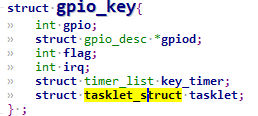
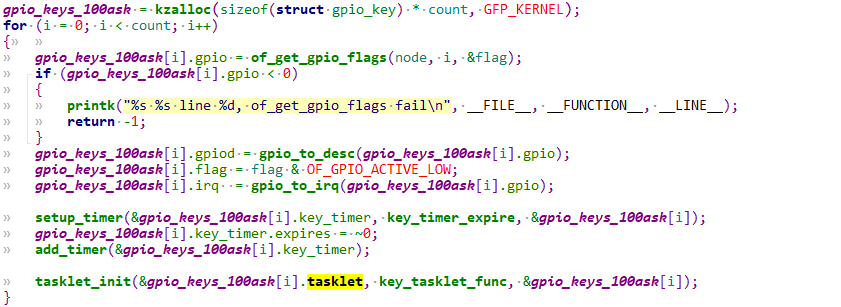
当按键按下,中断服务执行,那么此时需要调度tasklet去完成中断下半部的事情,每当一个按键按下,就会执行一次tasklet里面的函数,也就是key_tasklet_func

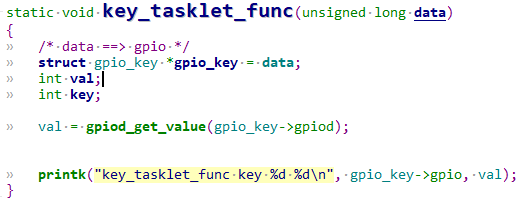
根据不同的gpio带来不同的data,这里key_tasklet_func下半部分只是简单打印出对应哪一个gpio,输出什么电平。
最终驱动卸载时调用tasklet_kill。
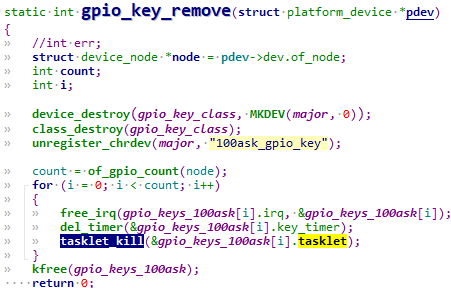
5 tasklet内部机制剖析
tasklet属于TASKLET_SOFTIRQ软件中断,入口函数为tasklet_action,这在内核 kernel\softirq.c 中设置:
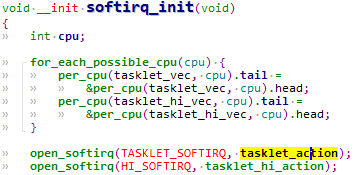

当驱动程序调用 tasklet_schedule 时,会设置 tasklet 的 state 为TASKLET_STATE_SCHED,并把它放入内核tasklet链表:
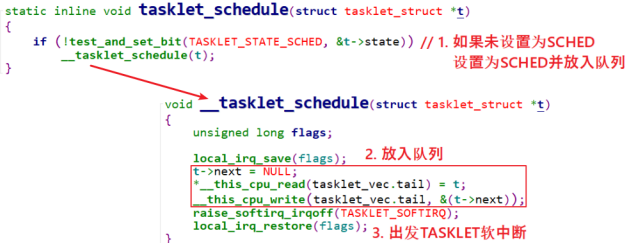
触发TASKLET_SOFTIRQ 软件中断,会调用 tasklet_action 函数,遍历tasklet 链表,进行状态判断后执行 func
函数,从队列中删除 tasklet。
可以看出:
1.tasklet_schedule 调度 tasklet 时,其中的函数并不会立刻执行,而只是把tasklet 放入队列
2.调用一次 tasklet_schedule,只会导致 tasklet 的函数被执行一次;如果 tasklet 的函数尚未执行,多次调用 tasklet_schedule 也是无效的,只会放入队列一次,TASKLET_STATE_SCHED状态会自行判断。
最终tasklet中的func执行要看tasklet_action的过程分析:
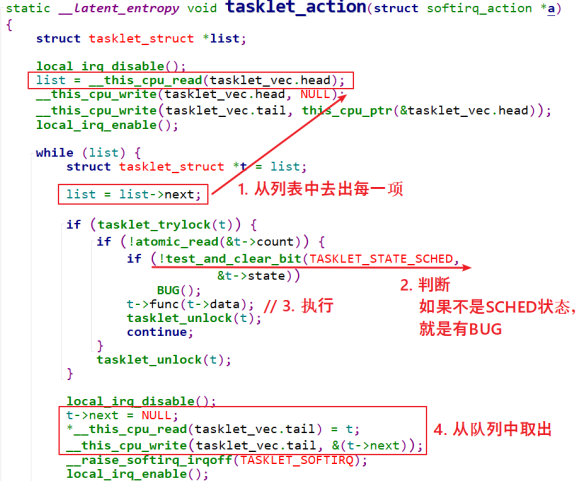
首先从链表中取出每一项tasklet,读取count,如果等于0表示有使能该tasklet,清除TASKLET_STATE_SCHED位,并且执行t->func,执行完该task中的func后从链表取出并且删除掉。